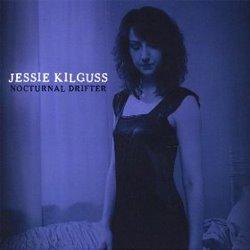Nocturnal Drifter

"I consider all of the arts to be interconnected," writes Jessie Kilguss, who began a career as a film actor before shifting media to become a singer. Indeed, this album reflects a cinematic aesthetic; each track is a story, what an independent movie would sound like if you could capture it in a three-minute song.
Listening to Nocturnal Drifter, one senses there is no more honest lyric than "I like the perspective/from outside looking in" on "Something About Lonely." Even when the songs are introspective, they remain observational, detached from the action, framing events and feelings with a filmmaker's eye.
Most deal with male-female relationships (what else is new?), often pleas from the woman to get the boy-man to stick around, but this is balanced with an accepting self-awareness. "This Time," practically a monologue set to piano, is addressed to an old acquaintance and potential lover, asking for another chance.
At the same time, the chorus has a meta-song quality as the singer acknowledges that she would like to mold the addressee's character with some "artistic license"—this isn't an out-and-out surrender, a take-me-back-I'll-do-anything plea. There are conditions. But this sort of transformation, one person rearranging another to suit her own needs, can only take place within a song, a fact that is also acknowledged acceptingly in the lyrics. "Well hey man/We do what we can," the song ends.
"31" celebrates the surprise and maturity of being, well, thirty-one: "…My body is catching up to my old soul…" Although each track is a stand-alone song, common themes emerge, and by the time we reach "Something About Lonely," second to last on the album, we understand that earlier songs seeking out a lover were not the pitiful hopes of a girl who does not know who she is without a man, but the considered decision of a woman who would now like the companionship she formerly rejected: "This solitude isn't as romantic as it was/when I was twenty one." She admits to liking the outsider role, but she is willing to make an exception for the right person.
Kilguss worked with the duo Charlie Nieland and Barb Morrison, who make up the production team Super Buddha, on her debut album as well as this one, her second. Super Buddha has such impressive credits as work with Blondie and Rufus Wainwright, but often this album could benefit from a less slick production. Kilguss' voice is a pleasantly raw alto, an everywoman voice that matches the observational you-know-what-I-mean? quality of the lyrics. That down-to-earthiness isn't enhanced by overly synthesized beats and back-up, as on "A Little Place Behind My Eyes," for example. So here's hoping Kilguss goes for a more stripped-down sound on her next album, to match the simplicity and wisdom of the songs.